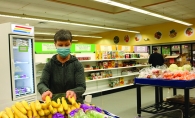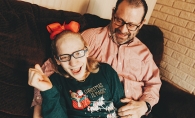Melissa Diamond, the director and founder of A Global Voice for Autism, didn’t intend to start her own organization. But she couldn’t get that little girl’s face out of her head. “I came up with the idea behind A Global Voice for Autism: The Jenin Autism Project while on a multi-faith pilgrimage trip to Israel,” Diamond says. After visiting the Princess Basma Center for Disabled Children, an organization in East Jerusalem that provides services to children with disabilities, she realized the resources even there were limited for children in the West Bank, who generally don’t have access to the Israeli medical system.
“Families in the West Bank can apply to travel to Israel for up to three weeks for treatment,” she says. “However, even when families can afford to travel to the center, the fact remains that autism treatments are intended to be implemented for at least a year, and three weeks is nowhere near enough time to make a difference in the lives of these children.”
“At the end of our tour at the center, a mother came over to our group with her daughter and asked us for help,” Diamond adds. “She asked me whether I could help her find a scholarship for her daughter to receive autism services in the United States, and I told her that I would try my best. I couldn’t get the little girl out of my mind for the rest of the trip. Children cannot control where they are born. They cannot control their gender, race, religion, nationality or socioeconomic status, and should not be denied access to services that can enhance their quality of life.”
During that 2012 trip, Diamond decided to find a solution for all children around the world who are born with disabilities.
“I stayed in touch with the family,” she says. “Most of the organizations in the West Bank that claim to serve children with autism simply serve as babysitting centers for children with disabilities. In many of these programs, the children are not treated well. There are also no public special education options for children with autism in the West Bank.”
As if the conditions weren’t dire enough, the social aspect might have been even worse. The heavy stigma that families experience when having a child with autism leads many families to hide their children in their homes; their parents feel embarrassed by them or do not know how to handle their behaviors in public. “Among the mothers and especially among the population as a whole, there is a strong belief that autism is the result of bad parenting, which increases shame from the families raising these children,” Diamond says. “Sometimes other parents intervene and try to parent their children in the community.”
At the core, the overwhelming problems stem from a general misinformation when it comes to disabilities like autism. The lack of understanding results in inadequate services for these children, says Diamond. When teachers or staff at centers that care for people with disabilities talk about the children, they refer to them as “cases,” and they treat them as such rather than as people. Too often the children are dismissed as incapable or provided services that are costly and ineffective (without scientific backing and with no measurable results).
After returning home, Diamond hit the ground running, creating A Global Voice for Autism in fewer than two years. “Our trip to Palestine was funded by a fellowship I was awarded by The Resolution Project at the Clinton Global Initiative University Conference in 2013, as well as by private fundraisers I held for the project. After receiving the funding, I posted the positions for the project on the Applied Behavior Analysis International website and received 12 applicants for the positions ... We returned in March from training mothers in Applied Behavior Analysis, giving lectures in the community to universities, teachers and government officials, and providing support to parents and siblings,” Diamond says. “Our program helps the mothers develop a cooperative where they will continue to provide ABA to each other’s children after we leave ... I have found through our community lectures that as understanding of autism increases, so does the motivation of community members to serve and include these individuals. I think that the culture will change, but that it will take time.”
&
To learn more visit thejeninautismproject. wordpress.com.









